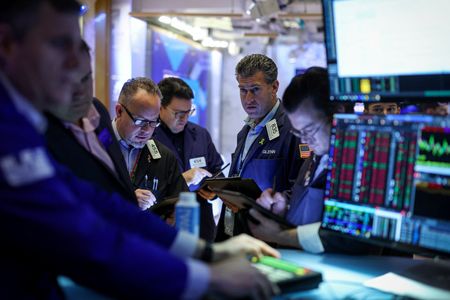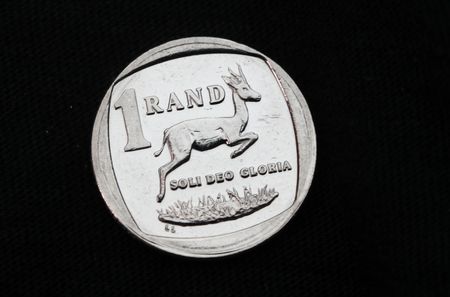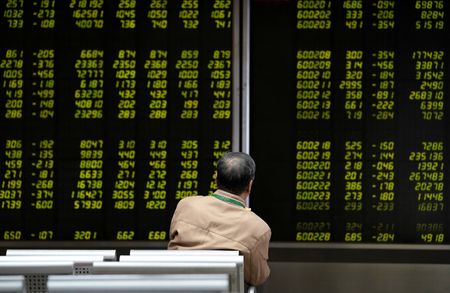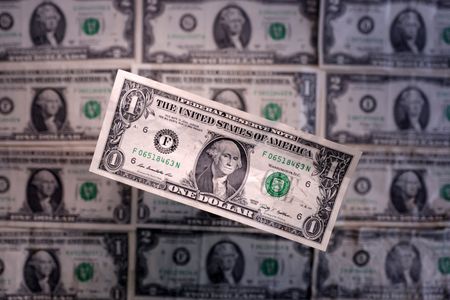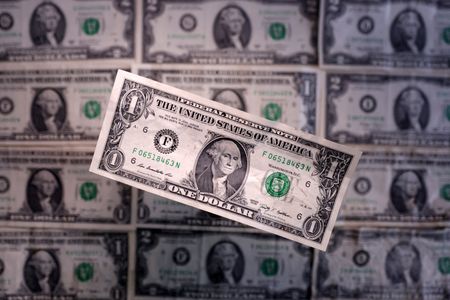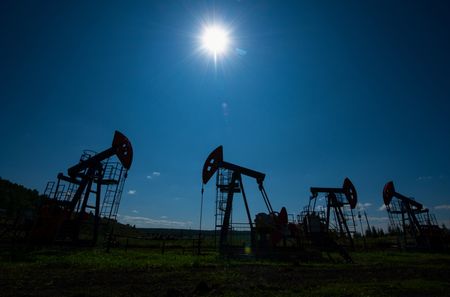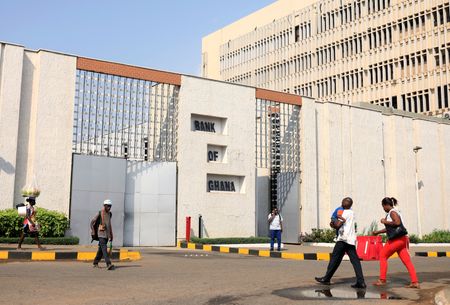By Sinéad Carew and Samuel Indyk
NEW YORK LONDON (Reuters) -MSCI’s global equities index rose on Friday while U.S. Treasury yields turned higher with the dollar as upbeat economic data and earnings appeared to help investors shrug off any jitters ahead of the U.S. presidential inauguration.
The U.S. dollar strengthened against major peers after four days of declines, while benchmark U.S. Treasury yields – after a three-session drop – hit a two-week low before reversing course.
Federal Reserve data on Friday showed U.S. manufacturing output increased 0.6% last month after an upwardly revised 0.4% rebound in November, likely as production picked up after a factory worker strike ended.
Elsewhere, data showed U.S. single-family homebuilding increasing to a 10-month high in December, indicating that construction activity regained some momentum at the end of the year, though rising mortgage rates and a glut of new homes on the market could constrain recovery.
All three of Wall Street’s major indexes were up for the day while the S&P 500 and the Dow registered their biggest weekly gains since the week of the U.S. presidential election. The Nasdaq scored its biggest weekly advance since early December.
“There’s an expectation that the economy is not as weak and inflation is not as big a problem as investors may have thought,” said Phil Orlando, chief equity strategist at Federated Hermes, pointing to the production and housing data as well as inflation data released earlier this week.
“Given the over-sold nature of the market, we’ve enjoyed a nice bounce here,” he said.
On Wednesday, softer than forecast core inflation data had pushed down the U.S. 10-year yield and supported stocks. Adding more encouragement to stocks this week were comments from Fed Governor Christopher Waller on Thursday signaling that three or four rate cuts are still possible in 2025 if data is weaker.
But Orlando was cautious about how well Friday’s levels would hold after Monday’s handover of the White House from Democratic President Joe Biden to Republican President-elect Donald Trump.
“You’re going to be swapping very different fiscal policy approaches. I’m wondering if the market doesn’t get spooked yet again, once Trump comes into office,” said Orlando.
“We don’t know what his talk is going to look like on Monday. We don’t know what sort of day-one executive orders he’s going to put through.”
Anthony Saglimbene, chief market strategist at Ameriprise, said that along with economic data, strong bank earnings reports and outlooks had improved investor confidence since Monday.
But like Orlando, he was worried about post-inauguration volatility: “I wouldn’t put a ton of faith in this holding until tariffs and immigration policy are clearer,” said Saglimbene.
On Wall Street, the Dow Jones Industrial Average ended up 334.70 points, or 0.78%, at 43,487.83 while the S&P 500 added 59.32 points, or 1%, to 5,996.66 and the Nasdaq Composite finished up 291.91 points, or 1.51%, at 19,630.20.
For the week, the Dow rose 3.69% while the S&P 500 added 2.91% and the Nasdaq climbed 2.45%.
MSCI’s gauge of stocks across the globe rose 6.60 points, or 0.78%, to 855.23. Before its official close, the index was showing a weekly gain of about 2.5%, which would be its biggest since November’s election week.
Earlier, Europe’s STOXX 600 index closed up 0.69% on the day for a 1.7% weekly gain, which was its strongest since the week starting Dec. 2.
In U.S. Treasuries, yields drifted higher in a choppy session, after the upbeat housing and industrial production data supported expectations that the Fed would slow the pace of rate cuts.
The yield on benchmark U.S. 10-year notes rose 1.5 basis points to 4.621%, from 4.606% late on Thursday while the 30-year bond yield rose to 4.8535% from 4.845%.
The two-year note yield, which typically moves in step with Fed interest-rate expectations, rose 4.5 basis points to 4.283%, from 4.238% late on Thursday.
In currencies, the dollar index rose on the day but showed a weekly decline after a six-week winning streak, as investors awaited the inauguration, with hopes for more clarity on policy.
The dollar index, which measures the greenback against a basket of currencies including the yen and the euro,
rose 0.37% to 109.37.
The euro was down 0.25% at $1.0272 while against the Japanese yen, the dollar strengthened 0.69% to 156.19.
But for the week, the yen was up as policymakers’ comments spurred bets for a quarter-point Bank of Japan rate hike next week. Sources told Reuters the BOJ was likely to keep a hawkish policy pledge and raise rates next week.
Sterling weakened 0.6% to $1.2166 after weaker than forecast British retail sales in December.
In commodities, oil prices closed lower on Friday but strengthened for a fourth-consecutive week, as the latest U.S. sanctions on Russian energy added to worries about oil supply disruptions.
U.S. crude settled down 1% for the day at $77.88 a barrel. Brent settled at $80.79 per barrel, off 0.62%.
Gold stocks in COMEX-approved warehouses have jumped by one-third in the past six weeks as market players sought deliveries to hedge against the possibility of import tariffs from the incoming U.S. president.
Gold prices fell on Friday but were on track for a weekly gain as uncertainties about Trump policies and bets on further interest rate cuts had lifted it above the key $2,700 level.
Spot gold fell 0.43% to $2,702.06 an ounce. U.S. gold futures rose 0.19% to $2,751.60 an ounce.
(Reporting by Sinéad Carew, Samuel Indyk, Additional reporting by Kevin Buckland. Editing by Mark Potter, Toby Chopra, Daniel Wallis and Rod Nickel)

